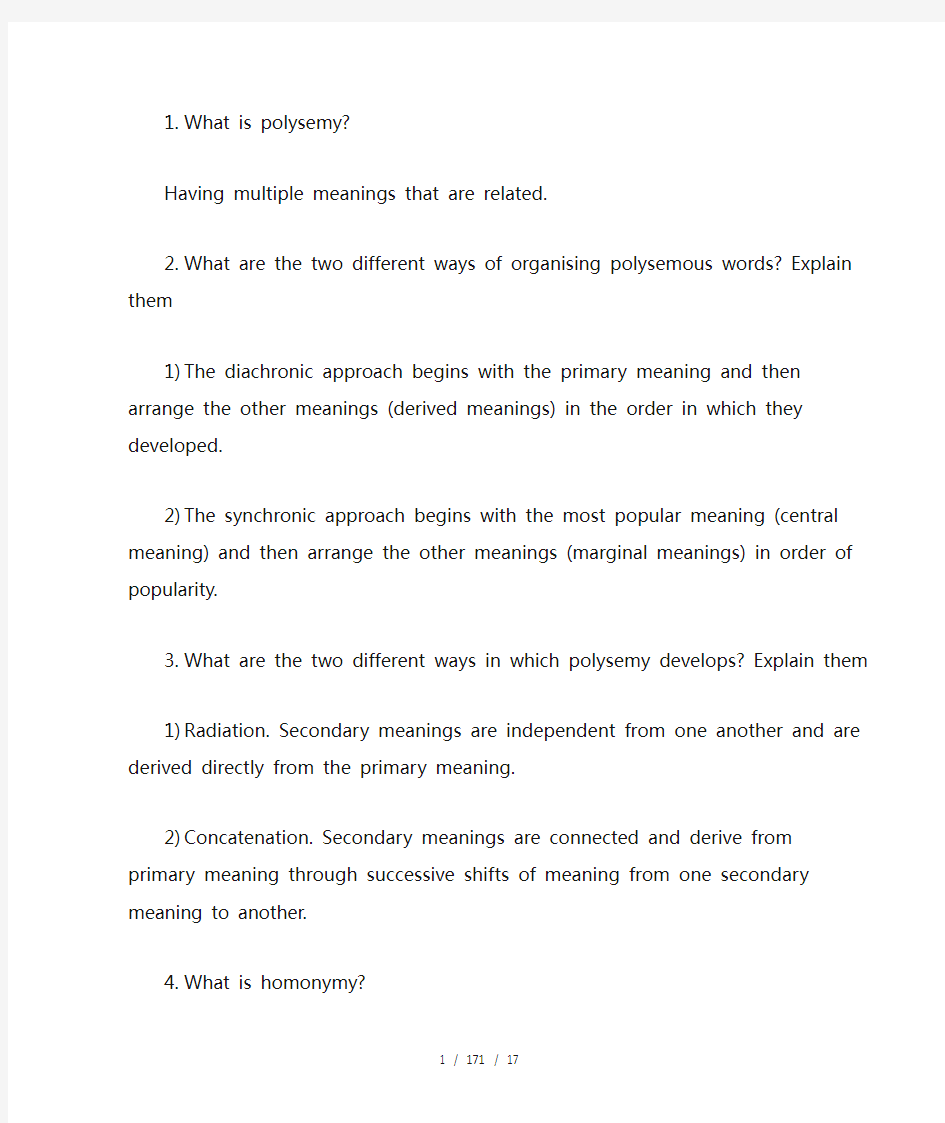英语专业英语词汇笔记

- 1、下载文档前请自行甄别文档内容的完整性,平台不提供额外的编辑、内容补充、找答案等附加服务。
- 2、"仅部分预览"的文档,不可在线预览部分如存在完整性等问题,可反馈申请退款(可完整预览的文档不适用该条件!)。
- 3、如文档侵犯您的权益,请联系客服反馈,我们会尽快为您处理(人工客服工作时间:9:00-18:30)。
1.What is polysemy?
Having multiple meanings that are related.
2.What are the two different ways of organising polysemous words? Explain them
1)The diachronic approach begins with the primary meaning and then arrange
the other meanings (derived meanings) in the order in which they
developed.
2)The synchronic approach begins with the most popular meaning (central
meaning) and then arrange the other meanings (marginal meanings) in
order of popularity.
3.What are the two different ways in which polysemy develops? Explain them
1)Radiation. Secondary meanings are independent from one another and are
derived directly from the primary meaning.
2)Concatenation. Secondary meanings are connected and derive from primary
meaning through successive shifts of meaning from one secondary meaning
to another.
4.What is homonymy?
Homonyms are works different in meaning but either identical both in sound or spelling or identical only in sound or spelling.
5.Give an example of a perfect homonym, a homophone and a homograph
1)perfect homonym 同音同形date日期/date红枣
2)homophone 同音异形Knew/new, meet/meat
3)homograph 异音同形record(v.)/record(n.)
6.Give an example of the rhetorical use of homonymy
Hi Jack (你好杰克)– hijack(打劫)
7.What is the difference between polysemy and homonymy? Give an example to
illustrate the difference
1)Polysemy is about connection of meanings. Book can mean a book as in “I
read a book”, and “I book a hotel room”. The second meaning is related to
the first one because in the past hotel staff will write the customers’
information on a book when reserving a room.
2)homonymy is about form. Lie can mean not being honest or being in a
horizontal position. These two meanings have the same form but no
connection.
8.Classify the following pairs of antonyms into complementaries (binaries),
contraries (gradable) or converses (relational). Explain why
1)Good/bad, contraries
2)odd/even, complementaries
3)above/below, converses
4)clean/dirty, contraries
5)remember/forget, complementaries?
6)old/young, contraries
7)before/after, converses
9.What is hyponymy? Give an example
The meaning of a more specific word is included in that of a more general word.
例Flower is the superordinate term, rose is the subordinate term.
10.What is synonymy?
Synonyms are words different in sound and spelling but nearly or exactly alike in essential meaning.
11.What is the difference between absolute and near (relative) synonyms?
1)Absolute synonyms – interchangeable in every way
2)Near synonyms – similar in denotation but have different shades of meaning
or different degrees of a given quality.
12.What are some of the reasons why synonyms exist?
1)Borrowing from other languages
2)Dialects and regional English
3)Figurative and euphemistic use of words
4)Coincidence with idiomatic expressions
13.What are some of the factors that discriminate between relative synonyms? Use
examples
1)Range of meaning. “timid” is more extensive because it can be used to
describe the state of mind at a time and the disposition, but “timorous” only
describe the disposition.
2)Degree of intensity. A “wealthy” person has much more money than a
“rich” person.
3)Differences in stylistic features. “ask” is used commonly and tend to be
colloquial. “question” is more formal.
14.(The development of English) What was the language spoken in the British Isles
before English? How was English introduced?
Celtic. Germanic tribe invaded and settled after Roman. They brought their own culture. It was called Anglo-saxon (the name of two tribes) and also called old English.
15.What are the three phases of the English language and what were their time
periods? What events marked the transition of one phase to another?
a)Old English (450 - 1150) ——Norman conquest from France in 1066, but
the real development of middle English started in the 12th century because
the ruling class spoke Anglo French and the peasants spoke Anglo-Saxon so
it took quite a long time for them to intermix.
b)Middle English (1150 - 1500) ——during Renaissance there was an
explosion of information and knowledge about Ancient Greece and Roman.
People stated to read so ideas spread. Greek and Latin words started
entering English. Besides, printing was invented, more can read and write
books.
c)Modern English (1500 – present)
16.Over its history, English has evolved from a highly inflected language to a nearly
non-inflected language. What is the difference? Give an example of inflection in English
Inflection means to modify a word to indicate grammatical relations. A lot of words in a highly inflected language have ending or form changes in order to
